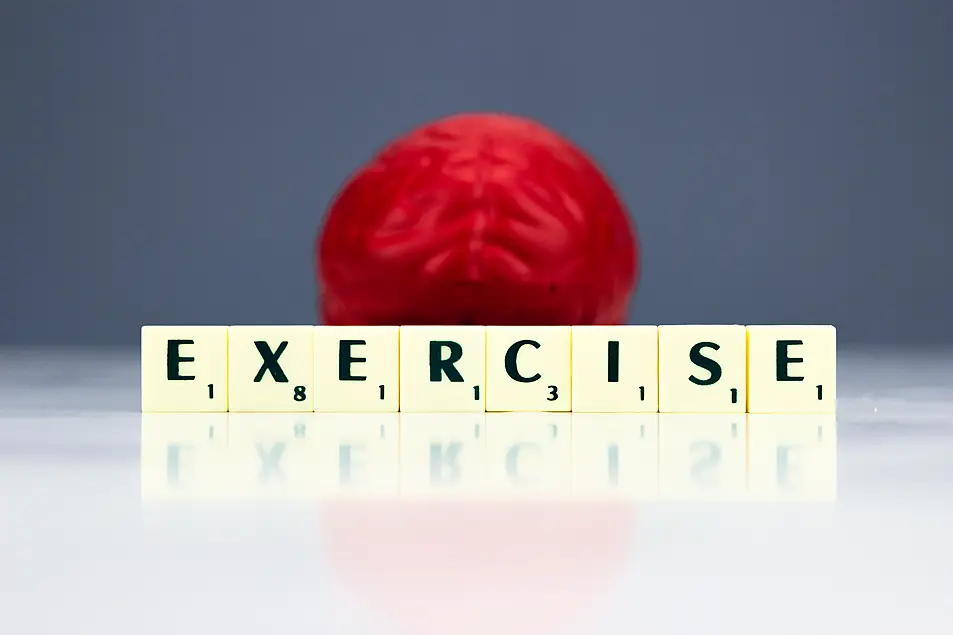A new study suggests that weekend bouts of exercise may be just as good for you as working out during the week, when it comes to slowing down mental decline.
The study examined two sets of survey data from the Mexico City Prospective Study, and found that the risk of “mild dementia” was reduced by an average of 15 per cent in the “weekend warriors” – who exercised once or twice per week – and by 10% in the “regularly active” – who exercised more often.
However, after taking account of factors that might influence the results, such as age, smoking, sleep duration, diet and alcohol intake, the researchers suggested both exercise patterns had similar effects.
But how does exercise impact our brains? And what type of physical activity should we be doing to stimulate our minds?
How does exercise impact our brains?

Regular exercise has a range of benefits for our memory and cognitive abilities.
“Immediately after exercise there’s an increase in oxygenated blood, and glucose is mobilised,” explains Rachael Mackenzie, neurological physiotherapist and director at Workathlete. “The neurotransmitters that are released after exercise are also directly active in the regions of the brain responsible for memory and learning.”
Physical activity could also influence the volume of our hippocampus – a small structure which helps us with memory and gain awareness from our environment.

“Over time, we see that children and adults who exercise have more volume in the hippocampus and an increased connection across the regions of the brain involved in thinking, planning and problem solving,” says Mackenzie.
Exercise also stimulates the production of brain-derived-neurotrophic factor, which Mackenzie describes as a “miracle grow for the brain”.
“This growth factor helps to maintain brain cells, stimulate connection between brain cells and helps the brain maintain plasticity,” explains Mackenzie. “Effectively, it creates new connections, allowing new learning to happen across the lifespan.”
Meanwhile, regular exercise could also help prevent or delay the onset of dementia.
“People who exercise are less likely to develop dementia,” says Mackenzie. “This is partly because of the reduced risk of developing the metabolic risk factors for dementia (like diabetes or cardiovascular disease) but also because of the way exercise protects brain cells and the connection between brain cells through the activity of brain-derived-neurotrophic factor and other neurotrophic factors.”
Can exercise help improve our mental health?
“Exercise has a direct effect on reducing rates of depression across the population,” highlights Mackenzie. “Exercise reduces the amount of stress hormones circulating and increases the amount of dopamine – the happy hormone – in the brain.”

Aerobic exercise in particular could help people cope better with stress.
“Aerobic exercise that involves a switch between high-intensity and moderate to low-intensity helps to train the stress response system to move between fight and flight mode (sympathetic activity) and rest/recovery mode (parasympathetic activity),” explains Mackenzie. “This helps to train the stress response system to recover. So, when stressful events happen during the day, a person doesn’t stay in stress mode and their nervous system is conditioned to recover.”
View this post on Instagram
What types of exercise is particularly stimulating for the brain?
If you are looking for an activity to stimulate your brain and body then look no further as Jade Imani, qualified personal trainer with Insure4Sport, has compiled a list of recommendations for the following age groups…
Ages 20-30
High-intensity interval training (HIIT)

“HIIT workouts boost cardiovascular health, which is beneficial for memory and mental clarity,” explains Imani. “HIIT’s varying intensity also keeps the brain engaged.”
Team sports

“Basketball, soccer, and similar sports require strategy, quick thinking, and social interaction, all beneficial for cognitive health,” highlights Imani.
Mackenzie adds: “Team and racket-based sports involve short bursts of high-intensity exercise such as chasing the ball, followed by periods of lower intensity.
“And the bonus is that they are done with other people, in a community – so we add in the positive effect of social connection, which reduces the risk of developing mental health conditions and dementia.”
Ages 30-40
Running or brisk walking
“Long, moderate-intensity runs or brisk walks help maintain cardiovascular health, supporting brain function,” explains Imani.
Yoga and pilates

“These activities build mind-body awareness and reduce stress, which can protect against cognitive decline,” notes Imani. “More challenging postures also improve focus.”
Ages 50-60
Strength training

“Regular weightlifting supports cognitive health by increasing blood flow to the brain and supporting brain-derived neurotrophic factor, crucial for neuroplasticity,” states Imani.
Tai Chi
“This practice involves slow, controlled movements, which improve balance and focus, helping with memory and attention,” says Imani.







